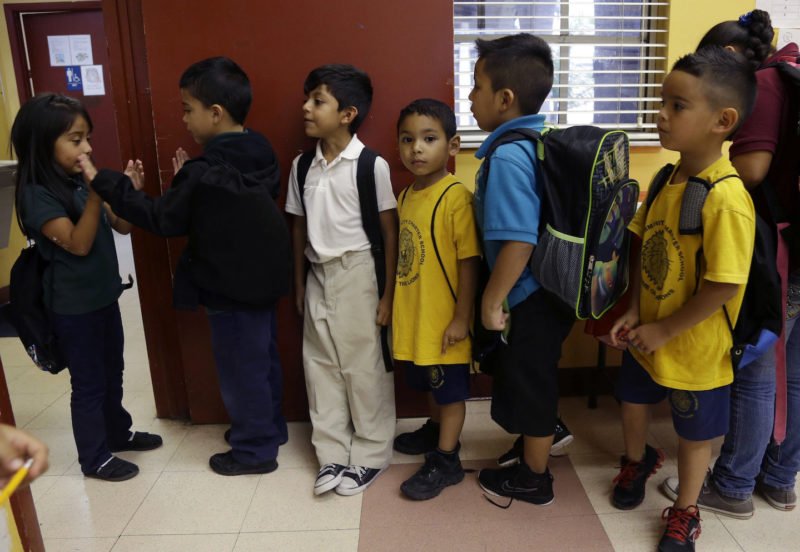
within the landmark 1982 selection in Plyler v Doe, the U.S. ideally suited court dominated allyoungsters are entitled to a public education, no matter citizenship or immigration popularity. The fact thatthis is set up regulation hasn’t stopped some faculty districts from implementing limitations to preventsome of the approximately 770,000 undocumented school–aged kids in the u.s. from registering forcollege. The scope of the efforts to block this essential right is the focal point of a brand new fileposted via the Georgetown college regulation middle’s Human Rights Institute and the girls’s Refugeefee.
“U.S. law is apparent on this point – no baby inside the u.s.a. need to be excluded from public training,”stated Mikaela Harris, a Georgetown regulation pupil and co-creator of ensuring every Undocumentedscholar Succeeds, “What we discovered is that that doesn’t continually play out in practice.”
The researchers spent three hundred and sixty five days inspecting the practices and regulations incollege districts in Georgia, ny, but maximum carefully in North Carolina and Texas. They interviewedauthorities and faculty officers, households, and undocumented students to decide how a few groups,in keeping with the document, “have barred immigrant youngsters from enrolling or meaningfullycollaborating in school via creating intentional and unintentional obstacles.” In some colleges,students are turned away outright; in others, they are “discouraged” from enrolling.
but, as one social carrier company told the researchers, “there’s a first-class line between discouraging and denying enrollment.”
The latest Immigration and Customs Enforcement’s (ICE) raids to detain and deport households who crossed the border in 2014 has fostered a climate of fear and anxiety that has prevented many kids from evenattempting the faculty enrollment process.
The families who do make this effort routinely face a wall of limitations, ranging from delays overcomplex paperwork to being grew to become away from school rooms as the end result of a districts’ subjective – and commonly misguided – interpretations of residency requirements and nation laws. in the meantime, a loss of translation and interpretation services go away households helpless and uninformedabout the enrollment technique.
The researchers interviewed “Juan,” a sixteen–yr–antique who fled violence in Honduras to journey by myself to Texas. trying to enroll, he changed into initially became away by way of the school principal, who believed Juan might now not bypass the state check. thankfully, the youngster had a communityendorse by his facet who may want to communicate on his behalf. Juan turned into soon admitted, even though he quick determined that the faculty became unwell–geared up to provide the type of one-on-one support he desperately wished.The reluctance to enroll undocumented students out of situation thatthey will drag down the college’s overall performance on statewide standardized checks is prevalent insome of the communities profiled within the document. One 17 yr–antique pupil stated to the researchers that she was instructed that she could not start college till after assessments, delaying her enrollment via 4 weeks.
Many colleges additionally won’t waver from overly rigid residency and guardianship necessities. or evenif those necessities are met, many undocumented college students who have overlooked years oftraining in their domestic united states of america are blocked due to the fact they’re perceived as being too vintage. due to the fact some districts examined in the record reward excessive graduation prices,college officials can be concerned that these students will “age out,” or flip 21 earlier than graduating.as a substitute, they will steer college students to alternative training packages, such as, but now notrestricted to, the ones meant for children with serious behavioral issues, although the scholar in querydisplays no such troubles. One figure, appalled at the try to ship her child to one of these software, commented, “My son is of proper man or woman and he shouldn’t have to visit a school for correctionalcollege students.”
The file gives a extensive variety of particular recommendations for officers on the federal, country, and district level, together with proper dissemination of legal records, a extensive availability of powerfultranslation offerings, and increased oversight of ICE enforcement sports. The authors also urge that states take gain of the new flexibility inside the new each pupil Succeeds Act and reshape student and trainerresponsibility systems to be much less dependent on check rankings – and consequently less in all likelihood to incentivize exclusion of undocumented students.
A sizeable downside is the scarcity of good enough data and schooling to assist groups with enrollingthese students and complying with the law. still, the purpose to discriminate is apparent in lots of cases, and curtailing these violations ought to be a national precedence.
“Discouraging undocumented children from enrolling or in any other case discriminating in opposition tothem within the public schooling machine contradicts our country’s essential values of offering sameopportunity for all,” said record co-creator Caitlin Callahan.


